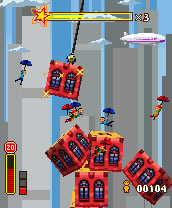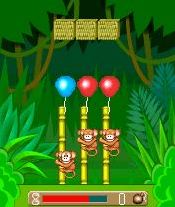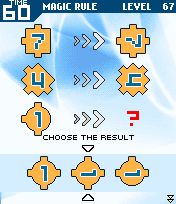Looking back on the 10 key mobile games trends of 2006
How was your year then? Here's mobile gaming's in ten nutshells

 When mobile game historians come to look back on 2006 in a couple of decades time, what will they be saying? (And yes, they WILL exist – what else is the Pocket Gamer team supposed to do when we get old and fusty? We're rubbish at pottering about in the garden.)
When mobile game historians come to look back on 2006 in a couple of decades time, what will they be saying? (And yes, they WILL exist – what else is the Pocket Gamer team supposed to do when we get old and fusty? We're rubbish at pottering about in the garden.)
Anyway, the chances are that we'll look back on 2006 as the year when mobile gaming grew up – when there were less publishers making more high-quality mobile games, with technological progress ensuring they looked better than ever.
That said, there have been frustrations too, even if they're more accurately described as teething problems in an industry that's still so new.
We've picked out the ten trends that sum up 2006 for Pocket Gamer. Think we've missed something out? We're eager to hear your views, so post a comment telling us what 2006's crop of mobile games has meant for you.
Top 10 trends from 2006| 1 Enter the console dragons Not that we're comparing EA to a huge scaly fire-breathing beast, you understand. But EA's proper full-scale entry into mobile games was one of the defining events of 2006. Pretty much every serious console game now has its own mobile little brother, many of which are being published by the console firms themselves, rather than being licensed out to other mobile firms. Eidos, Codemasters, Vivendi, Capcom, Sega – the big guns of the console world now have their sights trained on mobile, which means more money (and more marketing) is being put behind mobile games. |
 |
| 2 Unbranded games come of age It wasn't all about big console brands though. 2006 was the year that high-quality unbranded games got their fair share of attention. Think Tower Bloxx, Stranded, Turbo Camels: Circus Extreme... For all the talk of movie and console games, publishers know they need to come up with new ideas of their own for mobile too. Partly because if they're done well, they're more profitable – no profit sharing with the brand-owners. But also because the mobile operators are more willing to promote them, by making them game of the week and so on. Some of the Pocket Gamer team's favourite games this year have been unbranded too. And even EA is piling money into original mobile games. Alongside FIFA and Need For Speed, this year the publisher also funded its first original mobile game, Orcs & Elves. Which we hear is coming out in the UK soon. |
 |
| 3 Film games got better! That said (and sorry if we're see-sawing back and forth here) 2006 finally saw some decent movie games. At last! King Kong is the one that sticks in the mind, but the recent Casino Royale and Cars titles were also good. It's not so long since thousands of gamers were splashing out – on Lord Of The Rings and feeling disappointed. Like them or not, film games are important to the mobile games industry. People buy them who wouldn't normally play mobile games. If they like what they see, they buy more mobile games, which means more dosh for publishers, which means more mobile games... That said, we're about done with Star Wars now. Really. |
 |
| 4 The UK sucked for connectivity Imagine playing games where you can upload your high scores to compete against other people. Set up buddy leagues with your mates. Play massively multiplayer online games in real-time. Well, you can do all of these things. Just not here in the UK. Okay, that's not strictly true. There are some multiplayer games, for example on 3's portal. But elsewhere in the world, things have moved on. In the US, Gameloft released Asphalt Urban GT Multiplayer, for example. Operators there have massive interconnected games communities that let you recommend games to friends and compete in nationwide tournaments. Meanwhile in South Korea, MMORPG games like Gamevil's Path of a Warrior (pictured) are hugely popular. Us Brits are falling behind. Pocket Gamer has even received several review copies of games that had cool community features in – that were then removed for the UK! Even though if your phone is correctly set up with all the right WAP settings, they work! It's crazy, and frustrating. You don't know what you're missing. |
 |
| 5 Better 3D-capable handsets When talking about 3D gaming, you have to start with the phones themselves. There were more 3D-capable handsets around in 2006, particularly through the efforts of Sony Ericsson and Nokia. In turn, this made it more worthwhile for developers and publishers to make proper 3D games, which looked better and ran more smoothly than the earlier efforts. Phones aren't (yet) rivalling the graphical oomph of PSP or DS, but your snobby console-head mate would be hard-pressed to sneer at Need For Speed Carbon, the new Tomb Raider Legend (pictured) or Asphalt Urban GT 3D running on a decent handset. |
 |
| 6 Monkeys You can't have enough monkeys in mobile games. The year started with King Kong (ape pedants, please don't write in. He's still just a big monkey to me). But also Monkey Pole Climb (pictured), which scooped an award at this year's IMGA awards in February, yet STILL hasn't come out. Later in the year, iFone brought out Super Monkey Ball Mini Golf, HandyGames announced its Funky Monkey platform game while, er, the Gorillaz also made it to mobile. I know I'm stretching a point there. So on Pocket Gamer's freshly-invented Monkey Mobile Meter, 2006 scores well, but could have been better. If you know a mobile games developer, buy them a bonobo for Christmas as inspiration. |
 |
| 7 Brain training and virtual doggies Simply counting them was enough to raise your IQ a couple of points in itself. The mobile games industry is characterised by crazes, where every single publisher seems to have the same idea, at around the same time. This year, brain training was the big thing, rivalled only by virtual dog games. Apart from telling you that there's a lot of Nintendo DS fans working in mobile, the craze phenomenon simply takes some sorting to separate the wheat from the chaff. Which in our case means telling you that Brain Genius and Brain Challenge (pictured) are the best two brain trainers, while Dogz and My Dog are the two pup sims to go for. |
 |
| 8 A load of old balls Have you ever heard of 'Doom dreams'? The phenomenon was infamous a few years ago, and involved heavy players of Doom having dreams in which they ran around familiar locations (work, school or the supermarket) as if they were in the game, complete with weapons, strafing and everything. Well, when the average Pocket Gamer reviewer went to sleep this year, they were probably dreaming about endlessly swapping coloured balls, blocks, bricks or bubbles. There have been literally dozens of casual puzzle games out this year that have blended into one blobby mass of swapping similarly-coloured shapes around to make them disappear. Sure, these games are easy to grasp, and some have been genuinely addictive. But many more have been samey and – dare we say it – a bit dull. If we can have one wish granted for 2007, it would be for publishers and developers to put a bit more effort into what makes a good casual puzzle game. |
 |
| 9 One price doesn't fit all On the more positive side, 2006 saw mobile operators (who still sell the lion's share of mobile games in the UK) experimenting beyond the traditional £5-per-game pricing model. Cheaper games, 2-for-1 deals, free trial versions, pay-per-play and rental models where you paid 50p or – for a few days' play were all tried. It was good news for gamers on Pay-As-You-Go contracts, who often don't have £5 free on their credit. But it also encouraged us to try more games rather than just stick to the trusted brands, which has to be a good thing. Variety is the spice of life and all that. |
 |
| 10 Different kinds of brands We've talked about console and movie games elsewhere in this feature, but 2006 saw other kinds of brands getting into mobile. RealArcade's Gorillaz game may not have spurred a flood of pop stars to follow suit, but there were plenty of TV shows, celebrities (Paris Hilton, anyone?), and even fashion brands in the shape of Marc Ecko, who collaborated with Glu Mobile on a suitably yoof game. In all these cases, there'll be many more games on the way in 2007, although something tells us our dream of Primark's Celebrity Tetris with Myleene Klass is destined to remain unfulfilled. Ah well. |
 |
